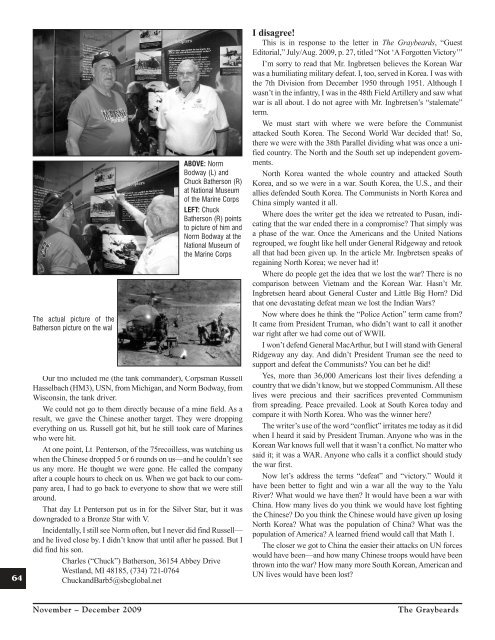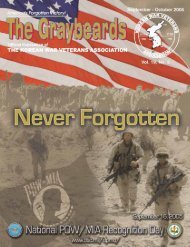gray06 Nov-Dec 2009_Gray01_Jan-Feb 2005.qxd.qxd - Korean War ...
gray06 Nov-Dec 2009_Gray01_Jan-Feb 2005.qxd.qxd - Korean War ...
gray06 Nov-Dec 2009_Gray01_Jan-Feb 2005.qxd.qxd - Korean War ...
You also want an ePaper? Increase the reach of your titles
YUMPU automatically turns print PDFs into web optimized ePapers that Google loves.
64<br />
The actual picture of the<br />
Batherson picture on the wal<br />
ABOVE: Norm<br />
Bodway (L) and<br />
Chuck Batherson (R)<br />
at National Museum<br />
of the Marine Corps<br />
LEFT: Chuck<br />
Batherson (R) points<br />
to picture of him and<br />
Norm Bodway at the<br />
National Museum of<br />
the Marine Corps<br />
Our trio included me (the tank commander), Corpsman Russell<br />
Hasselbach (HM3), USN, from Michigan, and Norm Bodway, from<br />
Wisconsin, the tank driver.<br />
We could not go to them directly because of a mine field. As a<br />
result, we gave the Chinese another target. They were dropping<br />
everything on us. Russell got hit, but he still took care of Marines<br />
who were hit.<br />
At one point, Lt Penterson, of the 75recoilless, was watching us<br />
when the Chinese dropped 5 or 6 rounds on us—and he couldn’t see<br />
us any more. He thought we were gone. He called the company<br />
after a couple hours to check on us. When we got back to our company<br />
area, I had to go back to everyone to show that we were still<br />
around.<br />
That day Lt Penterson put us in for the Silver Star, but it was<br />
downgraded to a Bronze Star with V.<br />
Incidentally, I still see Norm often, but I never did find Russell—<br />
and he lived close by. I didn’t know that until after he passed. But I<br />
did find his son.<br />
Charles (“Chuck”) Batherson, 36154 Abbey Drive<br />
Westland, MI 48185, (734) 721-0764<br />
ChuckandBarb5@sbcglobal.net<br />
I disagree!<br />
This is in response to the letter in The Graybeards, “Guest<br />
Editorial,” July/Aug. <strong>2009</strong>, p. 27, titled “Not ‘A Forgotten Victory’”<br />
I’m sorry to read that Mr. Ingbretsen believes the <strong>Korean</strong> <strong>War</strong><br />
was a humiliating military defeat. I, too, served in Korea. I was with<br />
the 7th Division from <strong>Dec</strong>ember 1950 through 1951. Although I<br />
wasn’t in the infantry, I was in the 48th Field Artillery and saw what<br />
war is all about. I do not agree with Mr. Ingbretsen’s “stalemate”<br />
term.<br />
We must start with where we were before the Communist<br />
attacked South Korea. The Second World <strong>War</strong> decided that! So,<br />
there we were with the 38th Parallel dividing what was once a unified<br />
country. The North and the South set up independent governments.<br />
North Korea wanted the whole country and attacked South<br />
Korea, and so we were in a war. South Korea, the U.S., and their<br />
allies defended South Korea. The Communists in North Korea and<br />
China simply wanted it all.<br />
Where does the writer get the idea we retreated to Pusan, indicating<br />
that the war ended there in a compromise? That simply was<br />
a phase of the war. Once the Americans and the United Nations<br />
regrouped, we fought like hell under General Ridgeway and retook<br />
all that had been given up. In the article Mr. Ingbretsen speaks of<br />
regaining North Korea; we never had it!<br />
Where do people get the idea that we lost the war? There is no<br />
comparison between Vietnam and the <strong>Korean</strong> <strong>War</strong>. Hasn’t Mr.<br />
Ingbretsen heard about General Custer and Little Big Horn? Did<br />
that one devastating defeat mean we lost the Indian <strong>War</strong>s?<br />
Now where does he think the “Police Action” term came from?<br />
It came from President Truman, who didn’t want to call it another<br />
war right after we had come out of WWII.<br />
I won’t defend General MacArthur, but I will stand with General<br />
Ridgeway any day. And didn’t President Truman see the need to<br />
support and defeat the Communists? You can bet he did!<br />
Yes, more than 36,000 Americans lost their lives defending a<br />
country that we didn’t know, but we stopped Communism. All these<br />
lives were precious and their sacrifices prevented Communism<br />
from spreading. Peace prevailed. Look at South Korea today and<br />
compare it with North Korea. Who was the winner here?<br />
The writer’s use of the word “conflict” irritates me today as it did<br />
when I heard it said by President Truman. Anyone who was in the<br />
<strong>Korean</strong> <strong>War</strong> knows full well that it wasn’t a conflict. No matter who<br />
said it; it was a WAR. Anyone who calls it a conflict should study<br />
the war first.<br />
Now let’s address the terms “defeat” and “victory.” Would it<br />
have been better to fight and win a war all the way to the Yalu<br />
River? What would we have then? It would have been a war with<br />
China. How many lives do you think we would have lost fighting<br />
the Chinese? Do you think the Chinese would have given up losing<br />
North Korea? What was the population of China? What was the<br />
population of America? A learned friend would call that Math 1.<br />
The closer we got to China the easier their attacks on UN forces<br />
would have been—and how many Chinese troops would have been<br />
thrown into the war? How many more South <strong>Korean</strong>, American and<br />
UN lives would have been lost?<br />
<strong>Nov</strong>ember – <strong>Dec</strong>ember <strong>2009</strong><br />
The Graybeards

















